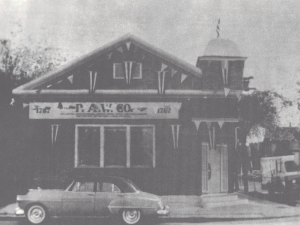After the Broadway-Fillmore neighborhood and Black Rock, Poles began to settle on Clinton Street between Bailey Avenue and the city line. As the area filled in with Poles, along with a few Germans and Hungarians, St. Casimir’s Church was established in 1890 giving the neighborhood its nickname Kazimierzow, or Kaisertown. As more Poles moved in, they began looking for an organization to preserve and promote their culture. To meet this end, on November 22, 1903 the Aleksander Fredro Literary Society and Library was established.
Formed at a meeting at St. Casimir’s, the organization first went by the name Fr. Augustine Kordecki Literary Society. This changed by the time they went to incorporate in April of 1904 when Aleksander Fredro was selected as their patron. Fredro, a nineteenth century author, playwright, and poet was the perfect selection because of his amusing comedies and light-hearted entertainment. In the early years, the society maintained its club rooms and library at 57 Weiss Street, and then at 194 Weimar for a while until 1911 when they decided to build a home of their own at 1787 Clinton.
 On November 3, 1912, the Aleksander Fredro Library and Hall formally opened with great jubilation. Father Stabenau from St. Casimir’s and Fredro President Francis Smyczynski each gave a speech. The one-act comedy, In Mother’s Eyes was performed and the A. Nowicki Orchestra kept people dancing late into the night. The building itself, located at the southeast corner of Fredro and Clinton Streets, measured 130 feet long and 40 feet wide. This gave the society enough space for meeting rooms, a theater, sitting rooms, and a library large enough to hold its growing collection. From this base of operations, the society became the cultural focal point of Polish Kaisertown. As the central hub the local branches of the Polish National Alliance, The Polish Roman Catholic League and the Polish Citizens Club started to meet in the Fredro’s club rooms. The society also became involved in neighborhood causes including a push to establish a park near Clinton and Spann Streets. Because of their efforts Houghton Park was open and added to the city park system.
On November 3, 1912, the Aleksander Fredro Library and Hall formally opened with great jubilation. Father Stabenau from St. Casimir’s and Fredro President Francis Smyczynski each gave a speech. The one-act comedy, In Mother’s Eyes was performed and the A. Nowicki Orchestra kept people dancing late into the night. The building itself, located at the southeast corner of Fredro and Clinton Streets, measured 130 feet long and 40 feet wide. This gave the society enough space for meeting rooms, a theater, sitting rooms, and a library large enough to hold its growing collection. From this base of operations, the society became the cultural focal point of Polish Kaisertown. As the central hub the local branches of the Polish National Alliance, The Polish Roman Catholic League and the Polish Citizens Club started to meet in the Fredro’s club rooms. The society also became involved in neighborhood causes including a push to establish a park near Clinton and Spann Streets. Because of their efforts Houghton Park was open and added to the city park system.
With all the activity around the building, membership in the literary society grew. In 1913, a gymnasium was added on and a women’s society was soon formed. The club also made good use of the stage, performing a number of Polish plays a year and using the hall for events such as a commemoration of the January 1863 Uprising and a fundraiser for Polish Relief. It wasn’t until 1920s that a men’s choir was created by club members and Singing Society was added to the name. In time the Fredro would join the Polish Singers Alliance and become very active in the national organization.
Things began to fall apart at the library after the end of World War II. Fading membership, internal strife, declining funds, and a surprise tax bill all had a part in the Aleksander Fredro Library and Singing Society’s demise. But even as things were collapsing, the members still proved their dedication to Polonia by holding a fundraiser for St. Mary’s Orphanage. In January 1954, the building was put on the auction block. In the end, the great Fredro Hall would become a toy store before being razed and replaced with the Peter Machnica Community Center.
Do you have any stories or memories about this location of the Polonia Trail? We would love to hear it! Please send us your story, and if it is chosen, it will be added to the site.
Send Your Story